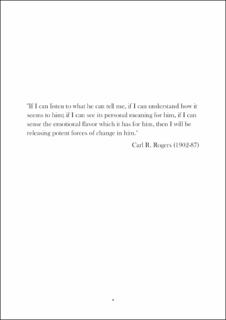Opplevelsen av å veilede klienter i utfordrende valgsituasjoner
Master thesis
Permanent lenke
https://hdl.handle.net/11250/2784808Utgivelsesdato
2021Metadata
Vis full innførselSamlinger
Sammendrag
Forskning viser at kvinners valg om å fortsette eller avbryte svangerskapet er komplekst og følelsesmessig utfordrende, og mange uttrykker behov for samtale, støtte og veiledning. Behovet forsøkes møtt gjennom Abortlovens §2, der kvinner gis rett til rådgivning og informasjon, for å selv kunne treffe det endelige valget, og denne veiledning tilbys blant annet av Stiftelsen Amathea.
Forskning viser at denne veiledningsrollen kan oppleves både meningsfull og utfordrende: veilederne skal gi støtte og tilrettelegge for refleksjon, uten å påvirke eller invadere. Som følge av dette belyses veiledernes behov for kommunikasjons-og veiledningsferdigheter. Men forskningen tar utgangspunkt i helsepersonell på abortklinikker eller sykehus, og inkluderer sjelden et veiledningsteoretisk perspektiv. Denne masteroppgaven kan være et bidrag til dette, og har belyst og drøftet problemstillingen: Hvordan opplever Amatheas veiledere valgsamtalen med kvinner som er usikre på om de skal fortsette eller avbryte svangerskapet?
For å diskutere problemstillingen har jeg utført en Q-metodologisk studie, der 19 av Amatheas veiledere har deltatt. Gjennom Q-sorteringer har veilederne uttrykt sine subjektive opplevelser med valgsamtalene ved å rangere 36 påstander. Sorteringene var utgangspunktet for en faktoranalyse, der en 4-faktorløsning valgt. Faktor 3 var bipolar og ble derfor splittet, og diskutert som to ulike faktorsyn. Faktorene ble de tildelt navnene:
Faktor 1 "Medvandrere med grenser"Faktor 2 "Kompetente med mot til å spørre"Faktor 3a "Forståelsesfulle uten tårer"Faktor 3b "Medfølende ansvarsgivere"Faktor 4 "Påvirknings-bevisste med behov for å hjelpe"
I masteroppgavens drøftingskapittel diskuteres faktorsynene i lys av relevant teori og forskning. Teorien inkluderer person-sentrert teori, empatisk forståelse, locus av evaluering, anerkjennelse, intersubjektivitet og mikroferdigheter. Faktorsynene viser at egen kompetanse oppleves som et samspill mellom kunnskap, ferdigheter og væremåter, som kommuniseres og tilpasses til klientens behov. Veilederne ønsker å forstå og støtte klientene, både gjennom anerkjennelse av utfordringene og stimulering av klientenes refleksjon. Resultatene viste flere perspektiv på veiledernes opplevelser av hvordan dette gjøres og utfordringer som kan oppstå. Fellestrekkene viser at forståelse og medfølelse kan uttrykkes gjennom ord og kroppsspråk. Samt for å holde fokus på klientene og unngå påvirkning, vil veilederne begrense kommunikasjonen av egne tolkninger og personlige erfaringer. Funnene belyser viktigheten av tilrettelegging for veiledernes kompetanse, og kan gi verdifull innsikt til veiledere som møter klienter i utfordrende valgsituasjoner. Research show that women’s decision to continue or suspend their pregnancy is complex and emotionally challenging, and many express a need for conversation, support and counselling. The need is ought to be met by the Abortion law §2, where women is given the right to receive counselling and information, to self be able to come to the right decision, and this counselling is offered by Stiftelsen Amathea among others.
Research shows that this counselling-role can be experienced as both meaningful and challenging: the counsellors are to give support and facilitate to reflection, without being influencing or intruding. In relation to this, the counsellors need of communication- and counselling-skills are illuminated. Yet the research focuses on health-personnel at abortion clinics and hospitals, and rarely includes a counselling-theoretical perspective. This master ́s thesis might add to that, and has illuminated and discussed the research question: How is the decision-counselling with women who ought to decide whether to continue or suspend their pregnancy, experienced by the counsellors?
To discuss this research question, I have performed a Q-methodological study, with 19 of Amatheas counsellors participating. Through Q-sortings the counsellors have expressed their subjective experiences with the decision-counselling by ranging 36 statements. The sortings became the basis for a factor analysis, were a 4-factorsolution were chosen. Factor 3 was bipolar and therefore split and discussed as two different factor views. The factors were named: Factor 1 "Along-goers with boundaries"Factor 2 "Competent with the courage to ask"Factor 3a "Understanding without tears"Factor 3b "Compassionate responsibility-givers"Factor 4 "Influence-aware with need to helping-need"
In the master ́s thesis discussion-chapter, the factor views are discussed considering relevant theory and research. The theory includes person-centered theory, empathic understanding, locus of evaluation, recognition, intersubjectivity and microskills. The factor views show that their own competence is experienced as an interaction between knowledge, skills and behaviors, and is communicated and customized to each client. The counsellors intend to understand and support the clients, through recognizing the challenges and stimulating the client’s reflection. The results illuminate different perspectives of the counsellors’ experiences with how to achieve this, and challenges that arises. The similarities show that understanding and compassion can be expressed through words and body language. As to keep the focus on the clients and avoid influencing, the counsellors limit their expression of interpretations and personal experiences. The results illuminate the importance of facilitation for the counsellor’s competence and may provide counsellors who meet clients in challenging decision- processes with valuable insights.
